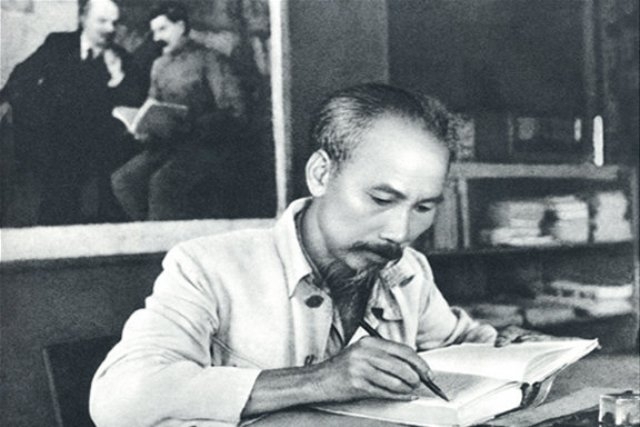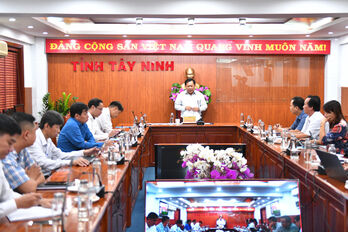
President Ho Chi Minh in his working room in the Viet Bac revolutionary base (present-day Thai Nguyen province)
Ho Chi Minh not only left a notable legacy of a great revolutionary cause, but also a shining example of virtues. He devoted his whole life to the country and the happiness of the people. Ho Chi Minh had all the qualities of a genius leader and was also the embodiment of a new kind of leader of the people: great but not lofty; noble and very simple with a close bond to the masses; wholehearted and devoted to sacrifice himself for the cause of national independence and reunification,as well as being an aspiration for a strong and prosperous country where people could enjoy a contented life. He regularly taught cadres and party members to uphold the spirit of service and responsibility and he himself remains a typical example.
Recalling the years when the country was dominated by foreign invaders and people suffered from slavery status, Ho Chi Minh decided to go and find the path of national salvation. Overcoming numerous difficulties and challenges, Ho Chi Minh devoted all his life to the nation, as he narrated: “My whole life has only one purpose, the interests of the motherland, and the happiness of the people. Whenever I have to hide in the mountains, or go to prison, and overcome all danger it is only for that purpose.” In his life and revolutionary career, he “had only the ultimate desire to make our country completely independent, our people completely free, and our compatriots have means of subsistence and schooling”.Until he had to leave this world, he only had one regret“...unfortunately I could not serve much longer”. It was the great aspiration and purpose that gave him a great will and energy “not to be seduced by wealth, not to be transformed by poverty and not to be bowed by power”. It was the fulcrum that helped him overcome all misery and difficulties in order to lead the people to the shore of happiness. Ho Chi Minh is a great leader in terms of intellectual leadership, a model of intimacy with great attachment to the people because “the revolutionary cause is the cause of the masses” and because the power of the people is invincible, thus people should be taken as the root.
From that point of view, Ho Chi Minh called on the senior leaders of the Party and State, as well as every cadre and party member, to uphold the spirit of service, the sense of responsibility for the people, and care for the material and spiritual lives of the people. According to him, if the country is independent but the people do not enjoy freedom and happiness, such independence does not mean anything. Therefore, each cadre and party member must fulfil their role as both “a leader and true loyal servant of the people”. Officials must be close to the people, understand their aspirations, and timely “help people solve their problems”. He strongly rejected all manifestation of bureaucracy, authoritativeness and opportunism that “tread on the neck of the people”.
When serving as the Head of the Party and the State, despite many tasks and a busy schedule, in order to understand people, President Ho Chi Minh still arranged to meet people at the Presidential Palace and took time to inspect grassroots units to “listen to opinions of party members and people”. Field trips in localities helped him handle the job and understand the situation properly, before making considered and reasonable decisions. On the other hand, meetings with people from all walks of life were considered as good opportunities for people to express their opinions and aspirations to the Head of State, as well as a great source of encouragement for the people, and a basis of enhancing the people’s confidence in the Party and State.
For Ho Chi Minh, he never considered himself higher than the people, as he was the faithful and devoted servant of the people, “as an obedient soldier goes to the front for the nation”. For the people, from intellectuals to the working class, President Ho Chi Minh was a unique example of virtue, a monument that radiates the light of a great soul and a great personality. People could see his closeness, warmth of love and tolerance, and simple lifestyle and humility. He looked down on contemptuous luxury and never enjoyed formal rituals. From the time when he worked as a photographer in Paris, France, until he was the President living in the capital city of Hanoi, he always lived a simple but elegant life. When peace was restored, he returned to Hanoi. The residence of the Governor-General of Indochina was taken as the Presidential Palace, but he only used the place to receive international leaders and guests. He lived and worked in a simple stilt house with only two small rooms. There was only a single bed, a wardrobe, a radio, a pair of slippers, and two pairs of khaki clothes. It was a great simplicity of a man who sacrificed his whole life the country and people.
Speaking about the moral example of President Ho Chi Minh and his spirit of devotion to serve the Fatherland and people, the Party affirmed: “The life of President Ho Chi Minh is as clean as light. He is a great example of the revolutionary spirit of resilience, the spirit of independence, self-control, humanity, and love for the people, ethics, carelessness and simplicity. His thoughts and virtues forever illuminate and elevate our hearts and minds.”
It has been nearly 50 years since President Ho Chi Minh passed away. In remembrance of the great work of the beloved leader, the whole Party, people and army are actively striving to gain achievements to celebrate the 128th anniversary of his birth; and are determined to fulfil the targets set by the 12th National Party Congress. Remembering him, generations of Vietnamese people are forever proud of an immortal person, as our Party has affirmed, Ho Chi Minh is the son of our people and country and he is truly a national hero that made our people and country proud./.
NDO
 Take decisive measures to accelerate public investment disbursement
Take decisive measures to accelerate public investment disbursement



